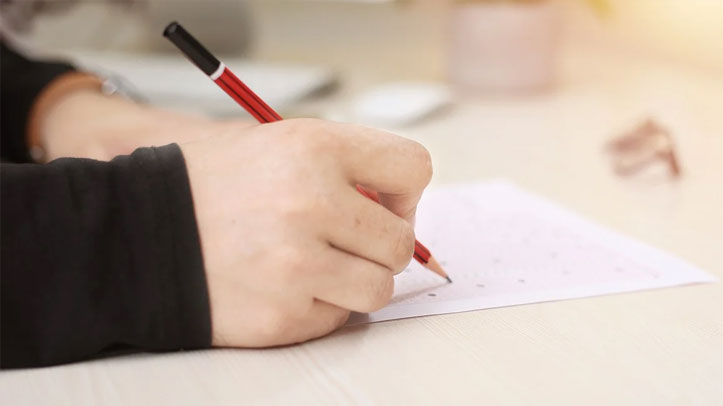
Our recent report ‘Some sort of normal: what children want from schools now’ summarised the findings from a survey of 2,000 children at the start of October this year. In this survey we asked what changes, if any, children would want to make to exams next year, to account for the impact of coronavirus on school. 40% said that they thought the exams should be adapted so that they were only assessed on the themes that they have covered in class and 25% said that they thought the exams should be delayed. Since this survey we have spoken to children across the country through focus groups and asked what they thought about exams and the impact that this has had on them. The focus groups happened before this week’s announcement on a further package of measures to enable exams to go ahead this year with additional support in place, and some of the children’s comments reflect the uncertainty experienced before these measures were announced.
Consistently, young people told us that they were concerned about the uncertainty around whether exams will happen or not next year.
“And it’s been really difficult with people trying to arrange, trying to get work done, we definitely had the best deal, but I just think everything is incredibly uncertain at the moment.” – Teenager
“Near the end of next year, we are going to do SATs that are going to high school and they might not happen because of lockdown but we’re still getting lots of practice, but we’re kind of getting behind because of the 5 months out so it’s quite hard” – Girl, 10, West Yorkshire
“I think they’re on track to happen, but anything can happen in the time space, so just hope they are happening” – Girl, 10, West Yorkshire
Young people were split on whether they thought exams should be cancelled. Some argued that they should be cancelled whilst others thought they should go ahead with changes.
Arguments for keeping exams centred primarily around feeling as though they don’t want their hard work to go to waste and not wanting to receive centre assessed grades.
“I don’t think they [exams] should be cancelled, because feel like that means all our hard work gone to waste. I do feel like content should be reduced, you’ve got to learn so much that you had to teach yourself, for A-levels especially you’ve got so much content. We were doing coursework by ourselves and that was stressful [because] you couldn’t get hold of a teacher sometimes because they had like, what, 40 students to talk to as well.” – Girl, 17, South West
“If you have teachers decide it, you always have someone who is not happy with the grade they are given. Or they say, maybe this teacher doesn’t like me, maybe this teacher is going to discriminate me. The thing is that the way the exams were, they were kind of an equalizer, even though that’s not really true, but everyone goes in and give out what they’ve learned, and that’s your grade. But if you do it with teachers, teachers are going to be subjective and biased, and that means there is some people who get higher, maybe they don’t deserve that grade. So, it’s one of the things that I often think about, how can we do this in a way that is fair for everyone” – Teenager
“[That’s] one of my biggest fears, not even Christmas but the effect of Christmas, I really, really don’t want to have centre assessed grades again, I want to be able to sit my exams, I don’t want it to be one of those things like with my GCSE’s, I didn’t even get to enter the exam hall, didn’t get to touch the papers at all” – Boy, 17
Concerns about exams going ahead with no changes ranged from worries about catching up to the effects of inequality.
Catching up
Young people told us that they had missed 5 or 6 months of school and felt that they can’t catch up with all of the content, particularly for the content heavy subjects such as History and Geography.
“I feel like more resources to catch more people up, because at least at my school, some people have done certain things, whilst some people haven’t, especially within the first major lockdown in like March, schools didn’t really have a plan that much and they could do a bit more just to make sure that everyone has caught up about it, everything that they’ve missed” Girl, 16, West Yorkshire
“The amount of work missed is like 3 months even if you do delay you aren’t going to make up for that three months, within the 3 months you may say people were learning at home but many people weren’t learning at home because they didn’t have the resources to connect online. Cancelling them and using predictive grades plus the work in lessons would be a good way to assess everyone’s grades.” – Girl, 18, South Yorkshire
“Now we are so behind, so all the ones that are doing exams this year are panicking” Girl, 18, South West
“All of my A-level subjects are very learning through speaking, I study A-level German which a huge part of German is being able to speak to each other, and politics which a huge part is debating with each other.” – Girl, 17
Over-testing
Some children felt they are being over-tested, with students taking two or even three full sets of mock exams before they sit their GCSEs or A-Levels. Because of the uncertainty in whether exams will happen, schools and young people are treating each set of mocks as though they are the full exams.
“Going through enough stress at it is now. If we do get to do the real thing [it’s going to be] 10 times or 100 times harder. Putting all our might into getting those grades now in case we don’t do exams. Once we get to GCSES I think we are all going to be worn out by [the time] exams happen. If I could decide I would cancel exams, obviously we could follow like Wales and Scotland because they have cancelled their exams and sort of give us a relief or step back instead of putting all the effort in now and then again because we have a second set of mocks in February. So tired of spending, like 2 to 3 hours tonight…Exam tomorrow so putting 2 or 3 hours in tonight. So paranoid that you are going to fail – it’s all on top of you.” – Girl, 15, South West
“I’ve just sat my mocks, we were in two weeks isolation when I should have had mocks so they crammed them into one week having three exams a day…Uncertainty surrounding everyone at the moment no one knows what grades are going to be used I think that adds to pressure and stress.” – Boy, 16, South Yorkshire
“We are doing progression exams every two weeks… during lockdown we didn’t have any kind of practice of exam technique, so the system now is great because we are getting a lot of practice in, but we are also getting a lot of really bad grades because we haven’t covered the content or we haven’t done this exam question since September last year” – Girl, 17
Inequality
Young people thought having exams with no adaptations would be unfair for some children who have missed more than others due to shielding or needing to isolate. They told us about children who do not have access to technology such as a laptop, tablet, or computer at home to study, as well as those who don’t have adequate space to study at home or have caring responsibilities.
“I know some year 11s who have missed half the work and have the GCSEs in summer, but I think, GCSEs have been cancelled in Wales or Scotland, I think it’s Wales, so especially for those who have missed most of the work, they now just having to cram it, especially the high content lessons, like history and Geography as well, it’s really hard for them”- Boy, 16, West Yorkshire
“I have the resources to go online and connect with my teachers, I’m thinking someone in Leicester might not have the same resources I do and might be so far behind.” – Girl, 17, South Yorkshire
“People at home not having resources. I was in lockdown for about a month more than everyone else because I also take care of my dad who’s disabled, so we was in lockdown for a lot longer than other people because we had to shield. Because I was having to care for him, I didn’t have time to do the work we were set, if we had problems at home like ill parents, we didn’t have time to complete the work that was being set for us” – Boy, 17, South Yorkshire
Alternatives to cancelling:
Young people suggested some alternatives to cancelling the exams:
- Reducing content to give children time to learn and revise rather than trying to fit a full course into a shorter time period
- Delaying exams further to give students time to catch up
“Maybe reducing content for those year 11s and 13s who did miss like 6 months of teaching. There needs to be a bit of leeway and looking into what practically can be taught in the time, there is going to be teachers who can’t catch up with their teaching.” – Girl, 17, North East
“I think they should reduce content by a lot and push back a bit more, but if they get pushed back too much that’s summer gone…” – Girl, 17, South West
“…getting students to do as many assessed pieces of work as they can and cancelling exams because exams are not going to reflect the true ability of students because students throughout the UK will have been through different circumstances, different situations and they won’t all have the same means to access education.” – Girl, 17, South Yorkshire
Centre-assessed grades
Some young people raised concerns that they would be given ‘centre assessed grades’ again and felt very strongly that this should not happen
“Last year for example I was in year 11 I was going to do my GCSEs but then coronavirus happened…some of my subjects I actually got what I was meant to get but some of them were so poorly marked it was unbelievable, for example in Business I was meant to get a 7, literally they gave me a 4 so I scraped a pass. GCSEs are requirements to get to 6th form, A-Levels are very very important so if centre assessed grades happen again it will crush my soul” – Boy, 17
“Centre assessed grades would probably not give me an A* AA [the grades needed for her university course], what if I have a bad week what if certain stuff is new to me, the grades I’m getting at the moment are lower than I typically would be getting because I’ve been in lockdown learning and is that being taken into account?” – Girl, 17
“[Centre assessed grades] I didn’t see it as a failure, I saw it as business that had not been finished yet. I didn’t get the best grades with my caring role as well as having my own problems with a disability.” – Boy, 16, South Yorkshire






